Jake Gyllenhaal Demolition
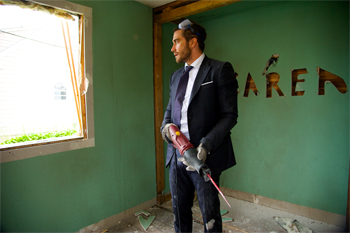
Jake Gyllenhaal Demolition
Cast: Jake Gyllenhaal, Naomi Watts, Chris Cooper
Director: Jean-Marc Vallée
Genre: Comedy, Drama
Rated: M
Running Time: 101 minutes
Synopsis: In Demolition, a successful investment banker, Davis (Jake Gyllenhaal), struggles after losing his wife in a tragic car crash. Despite pressure from his father-in-law (Chris Cooper) to pull it together, Davis continues to unravel. What starts as a complaint letter to a vending machine company turns into a series of letters revealing startling personal admissions. Davis' letters catch the attention of customer service rep Karen (Naomi Watts) and two strangers form an deep connection that becomes a saving grace for them both. With the help of Karen and her 15-year-old son (Judah Lewis), Davis starts to rebuild, beginning with the demolition of the life he once knew.
Demolition
Release Date: July 14th, 2016
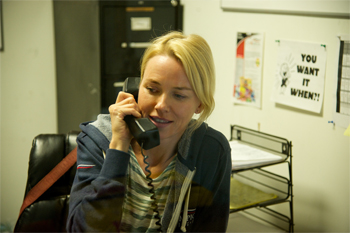 About The Production
About The Production
Demolition, directed by Jean-Marc Vallée (Wild, Dallas Buyers Club), defies the preconceived notions and expectations of an ordinary marriage as well as a privileged life of money and status. It takes the audience on a journey through struggle and forgiveness that ultimately celebrates love and the ability to reinvent a life of truth (with the help of some unexpected friends).
In Demolition, Davis Mitchell (Jake Gyllenhaal) is a successful Wall Street banker in his mid-thirties who has spent most of his life as society's definition of perfection, comfortably removed from any of its difficulties. When his wife Julia suddenly dies in a tragic car crash, we see him short circuit before our eyes. As we watch him attempt to dissect his mind, his father-in-law and boss Phil (Chris Cooper) is bewildered by his bizarre and inexplicable antics but tries to give him the benefit of the doubt and keep him on track - to no avail. On the night of his wife's death when the hospital's vending machine malfunctions, he writes a complaint letter that quickly evolves into a series of disarmingly honest exchanges with Karen Moreno (Naomi Watts), a customer representative for the vending company. As Karen struggles with her own emotional and financial burdens, they find an unusual connection - and solace - in one another. Through the friendship of Karen and her son Chris (Judah Lewis), Davis realises he must deconstruct the life he once knew in order to rebuild and uncover the truth he needs to feel truly alive and whole again.
At its core, the story of Demolition explores themes of loss, grief and reinvention. Facing his own crossroads, young screenwriter Bryan Sipe developed the story and script (included on The Black List) based on his own stunted creative journey. 'I sold a script pretty early in my career and then realised how hard it was to actually get anything made," says Bryan Sipe. 'I tried different characters and different stories and different genres and I got to the point where I just didn't know what worked. And I quit. But out of that experience came the character of Davis, a guy who couldn't feel anything anymore – he was numb and apathetic." Through the character of Davis, Bryan Sipe was able to articulate the loss he felt for his creative self. Upon his wife's death, Davis becomes a person who acts without consequence. He is reckless, unapologetic and brutally honest. He also develops an obsession with physically destroying things as he searches for emotional awakening, which came from Sipe's experience as a teenager where he had a job demolishing houses. 'It was the idea that once you tear everything down, you discover things. I was processing that that's how life works. I feel to understand something that is complicated - relationships, loss - you need to take things apart, to see what holds it together and then you can put it all back and make it stronger," explains Bryan Sipe.
Over five years ago, the Oscar-nominated producing team of Lianne Halfon and Russell Smith (partners with John Malkovich at Mr. Mudd Productions) approached Bryne Sipe about his script for Demolition. As Lianne Halfon recalls, 'We were given the script in 2009 as a writing sample for a book we were thinking of adapting. I remember reading it and thinking, -Whoa, we should make this!' The writing was so specific and the character pressed the plot forward, not the other way around. Everything about it seemed so raw." As Russell Smith further explains, 'We reached out to Bryan Sipe's people to see if he would be open to working with us on the script. He was, and about six months later, we started to send it to directors." Lianne Halfon and Russell Smith reached out to executive producer Nathan Ross to gauge the interest of French Canadian director Jean-Marc Vallée. Jean-Marc Vallée, convinced, and agreeing on the strength of the material, knew he was the guy for the job. Jean-Marc Vallée and Nathan Ross soon joined the team.
Lianne Halfon and Russell Smith continued to develop the project and eventually met with producers Molly Smith and Trent Luckinbill of Black Label Media (at the suggestion of co-producer Jon Schumacher). As Molly Smith recalls, 'This is one of those scripts that we had been tracking for years. We were lucky enough to get the project as a potential script for financing." Trent concurs, 'We were really excited about the project when it came around through our agency. We knew how good the writing was and how great the script was and with Jean-Marc attached, it was something we couldn't pass up."
Executive Producer and SKE President of Production Carla Hacken became a fan of Demolition when Bryan Sipe's screenplay appeared on The Black List in 2007. After Molly Smith (with Black Label Media) attached director Jean-Marc Vallée, Carla Hacken reached out to Smith about SKE's interest in becoming involved with the project because of the Company's desire to work with Black Label Media as well as a long standing relationship with Jake Gyllenhaal. As Jake Gyllenhaal was being cast, SKE joined Black Label Media and Mr. Mudd Productions as producers and co-financiers.
Recalls Byran Sipe of his initial creative meetings with Jean-Marc Vallée, 'Our conversations began over Skype because he is based in Montreal. You could tell very early on that the script meant something very personal to him." Bryan Sipe understood that Jean-Marc Vallée has very specific criteria for how he chooses the projects that he wants to be a part of. Agreeing to make Demolition was a solid indication to Bryan Sipe that his script had a profound affect on Jean-Marc Vallée.
As Jean-Marc Vallée explains, 'My producing partner Nathan Ross was sent the script of Demolition from Russ Smith and Lianne Halfon, after they saw Cafe De Flore at Tiff three years ago. I have long admired the films they've produced, and after I read the script, I knew that it was for me. I try to find the right stories with something beautiful in them - a humanity and great characters. I want to be moved when I read a script, I want to be impressed. It's one of rare quality, the kind of material that hits you at the right place, that makes you stop for a moment and think about life, how special it is, how precious, how beautiful it can be. This script had that effect on me. It was a page-turner. It was so unexpected, unpredictable, so fresh and fun, irreverent, intelligent and, yet, deeply moving."
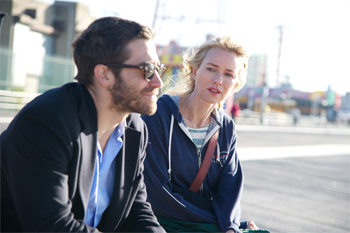 Finding The Cast
Finding The Cast As producer Russ Smith recalls, 'While Jean-Marc Vallée was shooting Wild, we began to get calls about Jake Gyllenhaal – a terrific actor who seems to get better with every movie, and he fit this film beautifully. He and Jean-Marc Vallée fell for each other immediately and we were off to the races." Also needed was a strong actor to play Karen's son and after a long search found Judah Lewis. Producer Molly Smith explains, 'Jean-Marc Vallée saw many kids with our great casting directors in New York, but we actually found Judah on tape – he's electric on camera and reminds you of a young Leonardo DiCaprio – he's just a star. And, he's got a beautiful face. But it's also his spirit – he's just really talented at such a young age."
Jean-Marc Vallée was impressed with all of the cast's performances and how they worked with him to develop their scenes. 'Jake Gyllenhaal and Naomi Watts have a natural chemistry. They're like kids playing," reflects Jean-Marc Vallée. 'They're so comfortable with acting, the way they react to each other and their love of the material and characters. The perfect example of this is the scene where they are making a couch -fort' and they put a blanket over the cushions and they're inside with flashlights and having fun. They had space to have fun and create and change their voices and make shadow puppets with a flashlight…and it was beautiful and amazing.
'Jean-Marc Vallée brought everything to this role that was so challenging and demanding in practice. In theory, on the page, that's one thing. But on the set, when it comes the time to portray Davis Mitchell, how does one play this guy who pretends to feel nothing? Everything had to be subtle, fine and balanced. And in order to do that, one has to not be afraid of exploring tons of stuff. That is Jake Gyllenhaal, the actor who is not afraid of trying stuff. I can't say enough about his performance. The physicality of the role, the emotional range, always ready to ad lib, try something new and different, taking chances, risks, going sometimes over the top, bringing it back, holding it back, singing, dancing… there is nothing he didn't try on the set of Demolition. It was a total blast to witness," says Jean-Marc Vallée
Jake Gyllenhaal's performance received high praise from Naomi Watts, as well. 'He's a wonderful actor. I had a great experience working with him. We're such an odd coupling that you wouldn't have thought right away that we were supposed to end up in a movie or in some sort of relationship. But that's what I love about it. It's odd and awkward and it's not always about the obvious choices."
Young actor Judah Lewis found working with Jake Gyllenhaal to be inspiring. Their on- screen moments are filled with raw emotion and Jake Gyllenhaal's lessons proved invaluable to Lewis. 'It's really cool for me to work with somebody with that much experience, sometimes we'd be in the middle of a scene and he'd do a line a certain way and it's so cool because that's what the scene needed," explains Lewis. 'It's really interesting to see the journey of all these different characters and how we develop and how we kind of find ourselves." Jake Gyllenhaal found Judah to be '…kind of wonderfully irreverent. He's sort of bold in this way and walks in with a confidence…and that was comforting to me on set. And, I think his performance is beautiful."
'Judah Lewis was a revelation in the role of Chris, Karen's son. That kid is a rock star. So gifted and yet so young. A natural," say Jean-Marc Vallée.
Jake Gyllenhaal says of Naomi Watts, 'Naomi Watts is so aware and engaged and game to go anywhere. That's an exciting feeling and a scary one. But, I guess that's also the way Davis should feel about Karen. She's someone who is a figure in his imagination until she's not – until she's right there in front of him – demanding truth and shaking up his whole world."
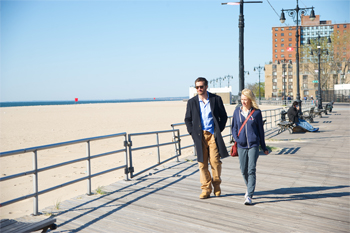 Judah remembers specific moments with Naomi, as well. In his words, 'She was really great to work with because she's a brilliant actress, you can tell that she is just in the moment and feeling what the character is feeling and acting as that character would. It was a true honor to work with her and I really hope I get to again."
Judah remembers specific moments with Naomi, as well. In his words, 'She was really great to work with because she's a brilliant actress, you can tell that she is just in the moment and feeling what the character is feeling and acting as that character would. It was a true honor to work with her and I really hope I get to again." 'Naomi Watts brought a rebellious tenderness to this role of a single mother in Queens, questioning her own life while trying to help her new friend, Davis," says Jean-Marc Vallée. 'It was a difficult and nuanced role that she played with such humanity and humility but yet, it was a complex one in her desire to seduce without seducing, and to try to be a mother that does the right thing." Jake Gyllenhaal was also very excited to reunite with co-star Chris Cooper. As he explains, 'In one of the first movies I ever did when I was 16 (October Sky), Chris Cooper played my dad. I also worked with him on a movie called Jarhead. So, Demolition was really an opportunity to come back after all that time and work with an actor that I have admired. To continue to be with him now as an adult, with more tools in my belt, to work with someone who's an expert like him, was an honor."
'Chris Cooper was fantastic in the role of Phil. A real pro, so in control of his art and at the same time, so emotional and vulnerable," says Jean-Marc Vallée. 'He was tough when he needed to be and equally tender when he had to."
The Characters: Insights From Their Alter-Egos
Davis (Jake Gyllenhaal): When Davis' wife is tragically killed, something triggers him internally and sends him on a very different route from the one he has been on. As Jake Gyllenhall explains, 'I think he's a guy who's followed all the rules….who said, -Oh, I'm supposed to be married at this age. I'm supposed to be making this much money at this time.' He's following a path that he's been told is the right path and has been successful in a lot of ways…he's made money and all the trappings you would consider success. But, he's lacking the richness of a real life. I think this tragedy opens him up to all the things that life can offer. As a result, he's really trying to search for what feels right to him and he tries to find himself again."
Karen (Naomi Watts): Karen is a single mother to 14 year-old Chris, who has become an irrepressible handful as he struggles with his own adolescent identity. The honesty and admissions in Davis' letters awaken something in Karen and together, these two broken people embark on a journey of discovery. As Naomi explains, 'Karen is really floored by Davis' honesty. He's very complicated but she likes how honest he is. She finds herself intrigued by these words that she's reading and it's sort of a wake up call… it's like he's writing to her. He taps into a part of her psyche that feels exciting and dangerous. I think they are both people who need fixing – who need waking up – and that happens by connecting through each other. It's almost like they both need a rebirth and they become these little kids. It's very sweet and honest and pure and innocent." Adds Jake, 'Karen's the person who really begins to see Davis and appreciate him. Not the Davis that has to perform and present himself a certain way. But the Davis who is a bit mad and a bit lost. The Davis who is really a mess. I think that once you are truly seen by someone for who you are, there's a great comfort in that."
Phil (Chris Cooper): Davis' father-in-law, devastated by the loss of his daughter, attempts to keep a stiff upper lip by throwing himself back into his investment business. He also dedicates himself to establishing a merit-based scholarship at Julia's alma matter, Princeton University, in her honor. Unfortunately, Davis shows little interest in this endeavor which prompts Phil to become gravely concerned by his son-in-law's increasingly erratic behavior. As Chris Cooper explains, 'My character has gotten a sense that not enough attention was paid to his daughter as he would have wished." Early on in the film, Phil tries to offer Davis some advice, explaining that sometimes you have to take things apart to really find out what makes them tick and learn how to put them back together again. What Phil doesn't realize is that Davis takes this literally; he becomes obsessed with all kinds of objects and physically tears them apart in his quest to emotionally right himself.
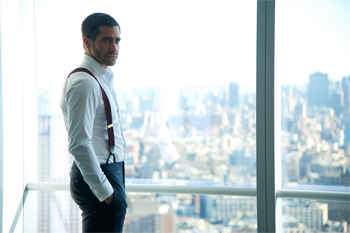 Chris (Judah Lewis): Karen's son, Chris, also has a profound effect on Davis. As Gyllenhaal explains, 'I think the relationship with Karen and her son are really the things that allow Davis to move to a place of real honesty. I think particularly seeing a 14-year-old kid struggling with who he is and his identity, and how the world can be so brutal to anyone who's dealing with identity at all…I think Chris is Davis' greatest teacher." For Chris, the relationship offers something he is not getting from his mother. Says Sipe, 'Davis just becomes someone that he can trust. He picks up on the fact that this is a guy who isn't going to lie to him, and is a straight shooter."
Chris (Judah Lewis): Karen's son, Chris, also has a profound effect on Davis. As Gyllenhaal explains, 'I think the relationship with Karen and her son are really the things that allow Davis to move to a place of real honesty. I think particularly seeing a 14-year-old kid struggling with who he is and his identity, and how the world can be so brutal to anyone who's dealing with identity at all…I think Chris is Davis' greatest teacher." For Chris, the relationship offers something he is not getting from his mother. Says Sipe, 'Davis just becomes someone that he can trust. He picks up on the fact that this is a guy who isn't going to lie to him, and is a straight shooter." 'To Whom It May Concern…" – The Letters
As the story progresses, Davis writes a series of complaint/confessional letters as a result of a mishap with a hospital vending machine on the night of his wife's death. It becomes clear that these letters are cathartic and liberating for him. As Molly Smith reflects, 'The letters to customer service become Davis' outlet, and the first time the audience understands the tone of this movie…that it's going to be a wild ride. It's going to be irreverent and you're going to go on an interesting journey with this man." Bryan Sipe and Jean-Marc Vallée relay the contents of Davis' letters through voice overs, something Smith concedes can be tricky. 'Bryan Sipe used voice over in the writing of these letters as a brilliant tool facilitating this journey in a really unconventional way. You realised he's a guy who was kind of going through the motions in life. He's a little bit numb and really hasn't found himself and doesn't know himself." Jake Gyllenhaal further explains, 'In the process of writing the letters, he ends up sort of spilling his guts to the vending machine company. Over a number of weeks, he starts up an imaginary relationship with this company, telling them all the things that he's feeling. Little does he know there's actually someone reading them on the other side and Karen contacts him and they develop a friendship. The universe brings them together as they meet at a similar point in their lives where the ground underneath them is very shaky, it's almost like looking in a mirror. This strange letter writing that he does ends up comforting someone else. My father always said to me that the job of art is to disturb the comfortable and comfort the disturbed. Davis decides he's going to be honest and that he has nothing left to lose, really."
Halfon reflects, 'Karen doesn't have many of the luxuries Davis has enjoyed. We get the feeling that things just fell into place for Davis early on, while Karen's life seems very loosely scotch-taped together. She is clearly overwhelmed - her kid is struggling, her boyfriend is a matter of convenience, dinner barely makes it to the table and she's a major stoner. But a failure to feel is not her problem " and she is a big part of Davis' reconnection. If she doesn't call Davis when she gets his letters, if she doesn't make that unusual gesture of reaching out to him - our story doesn't happen. '
Production And The Director's Process
According to writer Bryan Sipe, Jean-Marc's fresh directorial approach to filmmaking brings an organic authenticity to his work. 'He doesn't have a shot list. He doesn't storyboard anything. He feels out the space and he feels out the actors and the script and by the time he's done shooting, he's got it five different ways."
At first, this technique could be intimidating to an actor since it requires a large amount of trust in the director and an adjustment to the way one might typically prepare and perform a scene. Both Jake Gyllenhaal and Naomi Watts had heard about Jean-Marc Vallée's distinctive shooting style so, on the first day of filming, Jean-Marc Vallée sat with the actors to explain his process and assure them that they had nothing to fear. After the first week, both settled into his style and grew to appreciate it.
'It does change a performance," admits Naomi Watts. 'Sometimes it's hard because he's thinking so fast and you're keeping up and the camera's never cutting...you just give yourself to that process. It might be hard for some people because they've got it all mapped out in their head and they've arrived with choices and ideas. You have to give in to that and just lend yourself to how Jean-Marc Vallée envisions it, which is a great thing for an actor."
As Jake Gyllenhaal explains, 'I think a lot of why the movie is as beautiful as it is, is because of the way Jean-Marc Vallée wanted to make the movie and filmed it. Every time you take a turn in the film and you expect it to go one way, you actually go another way. And that other way is sort of an odd way. It's the Jean-Marc Vallée way. [laughs] And, I think that's what makes it really special." One of the many memorable scenes in Demolition takes place when Davis begins to freestyle dance through the streets of New York City. Jake Gyllenhaal describes the filming process and its challenges: 'Probably a week before we started shooting, Jean-Marc sent me a note that said, -I really want to have this dance sequence. I want Davis to just dance through the streets of New York City while listening to music.' He sent me a few videos of different dancing that he liked…sort of free-flowing, kind of dance. Then I thought, -It's gonna be a bit humiliating.' But, I like that feeling and that's a great thing about being an actor. So, Jean-Marc Vallée loaded up an iPod and said, -Here's the iPod, here's your earphones…just dance. We'll follow you. Just go dance around the streets.' Jean-Marc Vallée had the camera on his shoulder and I just walked out into the street and, as all the commuters were coming down the street, I just started dancing -- through them and around them all while Jean-Marc Vallée filmed. There was construction going on and I just dismissed all the cones and ran through the construction and danced with different people. I think, if you're doing something really crazy in New York City, most people tend to just ignore you. [LAUGHS] So I think that's kind of the metaphor for the movie in a lot of ways - allow yourself to feel that freedom that we all kind of bottle up. That sense of walking down the street trying to be cool where you're holding on to some idea that people think of you as opposed to just letting it go and saying, -Screw it, I'm gonna dance in the streets!'"
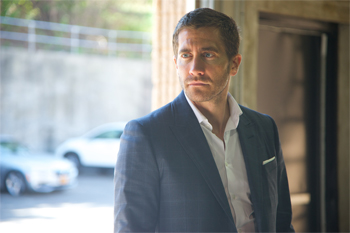 As Jean-Marc Vallée recalls, 'Jake Gyllenhaal had a nice way of putting it. He said, -It's like a dance… I'm dancing with you and dancing with Yves.' Both Jean-Marc Vallée and Yves were troopers and are now really comfortable with this kind of approach."
As Jean-Marc Vallée recalls, 'Jake Gyllenhaal had a nice way of putting it. He said, -It's like a dance… I'm dancing with you and dancing with Yves.' Both Jean-Marc Vallée and Yves were troopers and are now really comfortable with this kind of approach." Lighting, Designing And Orchestrating Demolition
Demolition reunites Jean-Marc Vallée with Dallas Buyers Club and Wild cinematographer Yves Bélanger who is also gaining notoriety for his own unique style. When Vallée signed on for Dallas Buyers Club, he asked Bélanger to join him as his director of photography. Since the film was very low budget and was to be shot in under a month, Jean-Marc Vallée saw the opportunity, through Yves, to test his theory of using natural light instead of studio lighting. According to Bélanger, Jean-Marc would always say, '-There's too many people on a film set…there's too many things happening. Everything could be simpler. Even the lighting.' And he [Jean-Marc Vallée] has a background in lighting, so he understands the lenses, the lighting and everything."
'I shot Demolition like I shot my previous films " with available light, hand held, always with the intention of making the audience feel like they're in the brain of the main character, and of course, with the intention of telling a story on film that looks real and authentic. No fancy shots, no fancy dollies, no obvious style that would distract or attract attention, I just shot the actors with the desire of serving the story and capturing the emotion, says Jean-Marc Vallée. 'What's unique about this one, is that when I got into the cutting room, I realized that I had to do something different than I'm used to. Instead of letting the shots breathe, I had to create a different rhythm, different pace of storytelling with a lot cuts in order to always capture the attention of the audience with something new, always stimulate their brain and feelings so that they don't have time to think, therefore, they don't have time to judge Davis in his strange journey. It's funny how Demolition works, cut almost like an action film, as it's the opposite, an internal film, as we follow the thoughts and dreams of a lost soul that tries to find its way back. There is something off beat about it, where soon in the process we stop wondering where this story is going, because we have no clue."
Bélanger shot Demolition using an Alexa (a German camera made by Affiflex) and compares its sensitivity to that of the human eye. 'It could adapt to everything and I realised that each time I was adding a light, it [the set] always looked lit. So instead of adding lights, when I was using the Alexa, I was [essentially] turning off the lights," explains Yves. Vallée feels that lights bother the actors and that once you start filming without lights, they are awarded a certain freedom. 'There's no pressure to hit a mark. It becomes about trying to find and capture the right emotion," explains Jean-Marc. As Gyllenhaal recalls, 'Two or three times very late at night, I'd have to take out my cell phone in the scene just so you could see. Jean-Marc is a real purist and he doesn't compromise creativity and that's a rare thing nowadays." In addition to his lighting techniques, Vallée also shoots rehearsals in an effort to add a feeling of authenticity and realism to his work.
The task of building spaces to be destroyed made Demolition an exceptional project for production designer John Paino and his team. Paino strongly felt that traditional sets where only facades are used would not work. This meant that, instead of building faux walls and rooms as is typically done for productions, Paino had to build all of the sets using real materials so that when they broke on camera, the insides would look exactly as they would in a real structure. Paino explains, 'For example, if you were building a cabinet, it's just a box and you would never see what's inside. However, Jean-Marc Vallée always favors doing things realistically. Real wood, glass, sheet rock, insulation, plumbing, electricity and any other element that Davis would eventually smash had to be incorporated into to the sets."
One of the most important sets in the entire film is Davis' home. Not only did it have to represent the affluent lifestyle of the character, but it also had to have areas that could be destroyed without damaging the entire structure. Originally, John Paino thought the only way to accomplish this was to build a house from scratch. However, locations manager Jeff Brown and his team found an existing home in the upscale Long Island town of Roslyn, New York. Jean-Marc was looking for something modern, minimalist and streamlined - and that's exactly what they found. The house was also made of wood and stucco, both of which are materials that lend themselves to be demolished easier and safer than if they were hammering into brick and concrete.
'It's almost a Buddhist, modernist house in suburbia with a great layout because it was L-shaped which meant that we could use the front area to add on. An addition was built matching the style of the home and existing architecture. It also worked for the bulldozer to go right through," recalls John Paino.
The addition took two weeks to build with part of it being done in a shop before completing the structure on-site. Art director Javiera Varas and his team added lighting, plumbing and electricity for the final assembly, along with foliage, planter boxes and exterior lighting to add realism.
Karen's house was another key location in the film. Karen's home needed to provide a stark contrast to Davis' house. 'We wanted it to be blue collar," explains John Paino. 'It's a different world. In her house, nothing is shiny. Everything is textural and inexpensive to show that the character's demographic was the polar opposite of Davis."
With the sets completed and ready for action, it was time for stunt coordinator Alex Terzieff to work with the actors and walk them through the scenes. Jean-Marc's 360-degree shooting style and up-close coverage meant that using stunt doubles was not an option. Against what Terzieff would normally allow, it was up to Jake and Judah to do all of the actual demolition themselves in a few long, continuous takes. They also had to get it right the first time.
 Terzeiff carefully blocked out each scene with the actors. Of principal concern was Davis' kitchen demolition. As Alex explains, 'In stunts, we never take chances. We usually choreograph the entire thing but in the Davis kitchen, there were simply too many variables so the focus shifted to safety." Two days prior to shooting the big demolition scene, Terzeiff and his team conducted certain tests to see what they would get into once they started smashing the walls. For the actors, Terzeiff and John Paino went in and swapped out some of the glass objects for plastic in areas where the hazards were at head and eye level with the actors.
Terzeiff carefully blocked out each scene with the actors. Of principal concern was Davis' kitchen demolition. As Alex explains, 'In stunts, we never take chances. We usually choreograph the entire thing but in the Davis kitchen, there were simply too many variables so the focus shifted to safety." Two days prior to shooting the big demolition scene, Terzeiff and his team conducted certain tests to see what they would get into once they started smashing the walls. For the actors, Terzeiff and John Paino went in and swapped out some of the glass objects for plastic in areas where the hazards were at head and eye level with the actors. Again with most stunts, where items land is also carefully orchestrated but this particular scene made that impossible. It was as random as it could be," recalls Terzeiff.
According to Alex, both Jake and Judah could not have done a better job (it also helped that Judah plays baseball so his swings were perfect). Neither actor lost their grip on any of their tools nor did anything accidentally went flying. The scene also took a level of physical demand. 'Jake is athletic and everything he did on this was flawless. He must have swung that sledgehammer a minimum of 250 times during the course of demolishing the kitchen, living room and bathroom using a 10 pound sledgehammer. Not a lot of actors could have gotten through that," explains Terzeiff.
With the inside demolition complete, the last major scene to shoot was Davis driving a bulldozer through the front of his home. Having an actor operate heavy machinery was another first for Alex, but Jean-Marc Vallée wanted to have Jake attempt it and Jake Gyllenhaal was fully onboard. Terzeiff brought in two professional bulldozer operators to train Jake, who picked up the skills almost immediately. When Jean-Marc Vallée yelled 'action," Jake Gyllenhaal was able to work the wrecking machine and managed to push the faux addition of the house right up to the actual foundation without breaking a window or causing any damage to the existing structure. Once the scene was over, the crew assessed the damage and found that he had stopped within 12 inches of hitting the existing home, which was amazing since Jake Gyllenhaal had no way of telling how close he was to the house. Cameras were also placed inside to capture the destruction from that point of view.
Demolition celebrates the organized chaos of the universe and the ability for one individual to find a way back to life's path and rediscover the capability to love unconditionally. 'Under the guise of a meditation on grief, a study on loss, Demolition is a film that celebrates life and reminds us to simply take the time to live and love. I related to Davis a lot. I, too, forgot how to love at one point in my life. I was too busy trying to -make it' – earning money, paying the bills…I was busy creating a life and forgot that I could also enjoy that goddamned life. I felt numb. I did so many things because they were easy," explains Jean-Marc Vallée. "In Demolition, I had to create a different rhythm, different pace of storytelling than previous films…to always capture the attention of the audience with something new, always stimulating their brain and feelings so that they don't have time to think, therefore, they don't have time to judge Davis in his strange journey. I hope the audience will receive Demolition as more of an emotional experience rather than a cerebral one."
Demolition
Release Date: July 14th, 2016
MORE
- Mission: Impossible Fallout
- Glenn Close The Wife
- Allison Chhorn Stanley's Mouth Interview
- Benicio Del Toro Sicario: Day of the Soldado
- Dame Judi Dench Tea With The Dames
- Sandra Bullock Ocean's 8
- Chris Pratt Jurassic World: Fallen Kingdom
- Claudia Sangiorgi Dalimore and Michelle Grace...
- Rachel McAdams Disobedience Interview
- Sebastián Lelio and Alessandro Nivola...
- Perri Cummings Trench Interview



